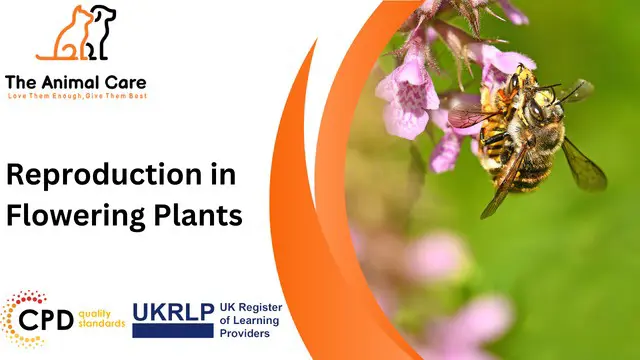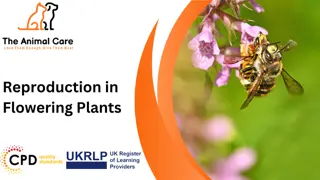
Reproduction in Flowering Plants
UKRLP Recognised | CPD Accredited & Certified | Lifetime Access | Free PDF Certificate | 24/7 Expert Tutor Support
The Animal Care
Summary
- Certificate of Completion (PDF) - Free
- Transcript (PDF) - £2.99
- Transcript (Hard Copy) - £7.99
- Certificate of Completion (Hard Copy) - £9.99
- Exam(s) / assessment(s) is included in price
- Tutor is available to students
Add to basket or enquire
Overview
Did you know that flowering plants have developed ingenious strategies for reproduction, enabling them to flourish in diverse ecosystems worldwide? In the course "Reproduction in Flowering Plants," we delve into the fascinating world of plant reproduction and unravel the secrets behind their evolutionary success.
Explore the intricate process of sexual reproduction in flowering plants with this comprehensive theoretical course. Dive into four sections covering various aspects, from the structure of flowers to the formation of fruit. Gain a deep understanding of pollination, double fertilization, and the development of embryos and seeds.
Learning Outcomes:
- Understand the structure and functions of the male and female parts of a flower.
- Identify different types of pollination and the agents involved.
- Examine the intricate process of double fertilization and the development of endosperm.
- Gain insights into the formation of fruit and its significance in plant reproduction.
CPD
Course media
Description
Embark on a captivating journey into the world of reproductive mechanisms in flowering plants with our course on Reproduction in Flowering Plants. Through a series of meticulously designed modules, you will acquire a profound understanding of the fascinating processes that allow plants to perpetuate their species.
In the first section, you will delve into the structure of flowers, unravelling the secrets of both the male and female reproductive parts. Explore the intricate steps of microsporogenesis and megasporogenesis, gaining a comprehensive insight into the formation and maturation of pollen grains and ovules.
Moving on to the second section, you will discover the various modes of pollination and the agents that facilitate this vital process. From abiotic agents like wind and water to biotic agents like birds and bats, you will unravel the intricate adaptations that flowers have developed to ensure successful pollination.
The third section takes you deeper into the complexities of pollen-pistil interaction and double fertilization. Learn about artificial hybridization and the development of endosperm, as well as the formation and growth of the embryo and seed.
Finally, in the fourth section, you will explore the transformative journey from fertilized ovule to the formation of fruit. Discover the various stages and processes involved in fruit formation and gain insights into the significance of fruits in dispersing seeds.
Join us on this enchanting journey into the world of Reproduction in Flowering Plants, unlock the secrets of nature's fertility, and expand your understanding of plant life.
Course Curriculum:
Section 01: SEXUAL REPRODUCTION IN ANGIOSPERMS - PART I
- Structure of a Flower
- Structure of Male Part of Flower
- Microsporogenesis
- Structure of Female Part of Flower
- Megasporogenesis
Section 02: SEXUAL REPRODUCTION IN ANGIOSPERMS – PART II
- Pollination and Its Types
- Cross Pollination and Outbreeding Devices
- Abiotic Pollinating Agents & Adaptations in Flowers
- Biotic Pollinating Agents & Adaptations in Flowers
- Ornithophily and Chiropterophily
Section 03: SEXUAL REPRODUCTION IN ANGIOSPERMS – PART III
- Pollen-pistil Interaction & Double Fertilization
- Pollen-pistil Interaction & Double Fertilization (Contd.)…
- Artificial Hybridization & Development of Endosperm
- Artificial Hybridization & Development of Endosperm (Contd.)…
- Development of Embryo & Seed
- Development of Embryo & Seed (Contd.)
Section 04: SEXUAL REPRODUCTION IN ANGIOSPERMS – PART IV
- The Formation of Fruit
- The Formation of Fruit (Contd.)…
Who is this course for?
- Botany students seeking a comprehensive understanding of plant reproduction.
- Researchers and scholars interested in the intricate mechanisms of flowering plant reproduction.
- Educators looking to enhance their knowledge and teaching resources in plant biology.
- Nature enthusiasts keen to deepen their understanding of the fascinating world of plants.
Career path
- Botanist: £20,000 - £40,000 per year.
- Plant Researcher: £25,000 - £45,000 per year.
- Ecologist: £25,000 - £50,000 per year.
- Horticulturist: £18,000 - £30,000 per year.
- Environmental Consultant: £25,000 - £45,000 per year.
- Science Educator: £22,000 - £40,000 per year.
Questions and answers
Currently there are no Q&As for this course. Be the first to ask a question.
Certificates
Certificate of Completion (PDF)
Digital certificate - Included
Transcript (PDF)
Digital certificate - £2.99
Transcript (Hard Copy)
Hard copy certificate - £7.99
Certificate of Completion (Hard Copy)
Hard copy certificate - £9.99
Reviews
Currently there are no reviews for this course. Be the first to leave a review.
Legal information
This course is advertised on reed.co.uk by the Course Provider, whose terms and conditions apply. Purchases are made directly from the Course Provider, and as such, content and materials are supplied by the Course Provider directly. Reed is acting as agent and not reseller in relation to this course. Reed's only responsibility is to facilitate your payment for the course. It is your responsibility to review and agree to the Course Provider's terms and conditions and satisfy yourself as to the suitability of the course you intend to purchase. Reed will not have any responsibility for the content of the course and/or associated materials.





